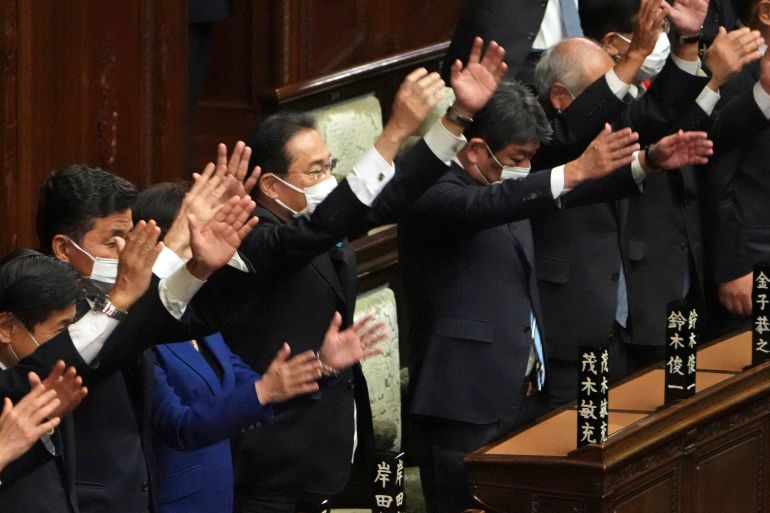Japan’s Kishida dissolves parliament heralding Oct 31 polls
Campaign formally kicks off next Tuesday with the ruling LDP expected to dominate against lacklustre opposition.

Japan’s new Prime Minister Fumio Kishida has dissolved parliament, setting the stage for an election at the end of the month that is likely to focus mainly on the coronavirus pandemic.
Kishida enjoys reasonable public support after just over a week after he replaced the unpopular Yoshihide Suga in the job, polls show, boding well for his goal of maintaining a lower house majority for the ruling Liberal Democratic Party (LDP) and its Komeito party coalition partner.
Keep reading
list of 3 itemsJapan faces rising inequality after eight years of Abenomics
Kremlin denounces Japan’s sovereignty claim over disputed islands
Voters will want to see a government with plans for decisive action to end the pandemic and rebuild the economy.
“I want to use the election to tell the people what we’re trying to do and what we’re aiming for,” Kishida told reporters who gathered at his office.
Reflecting on his first 11 days in office, Kishida said: “I’ve had a very busy schedule but strangely, I’m not feeling tired — I’m feeling fulfilled.”
Tadamori Oshima, the speaker of the more powerful lower chamber, announced the dissolution at a plenary session.
At the announcement, all 465 lower house lawmakers stood up, shouted “banzai” three times and left.
A recent Sankei newspaper poll showed that about 48 percent want the Kishida administration to work on COVID-19 most, followed by economic recovery and employment.
A separate NHK polling showed Kishida’s cabinet with a 49 percent approval rating – 13 percent lower than the approval rating of Suga’s first cabinet in September of 2020.
Kishida’s party is promoting his push for COVID-19 measures, including supplying oral antiviral medication this year, as well as his vision of realising a “new capitalism” that focuses on economic growth and redistribution of wealth.
The ruling party has also called for a sharp increase in defence spending to acquire the capability to destroy ballistic missiles amid China’s increasingly assertive posture over Taiwan.
The last lower house election was held in 2017 under former Prime Minister Shinzo Abe.
Suga. his successor, lasted just a year as prime minister with his support taking a battering over his handling of the pandemic and determination to push ahead with the delayed Olympics despite public opposition.
Opposition on the ropes
On Wednesday, Kishida held a phone meeting with his British counterpart, Boris Johnson, and reiterated their commitment to a free and open Indo-Pacific region, according to public broadcaster NHK.
Kishida said he wants to further develop bilateral relations, calling Japan and the United Kingdom globally strategic partners.
The largest opposition party, the Constitutional Democrats (CDPJ), led by Yukio Edano, has highlighted issues such as its support for same-sex marriage and different surnames for couples.
The LDP remains socially conservative, and while progress has been made on LGBTQ rights in society, Kishida has said he was not in favour of same-sex marriage.
The biggest challenge for Constitutional Democrats is their low support ratings.
A recent poll by the Asahi Shimbun daily found only 13 percent were planning to vote for them, far behind the LDP’s 47 percent; most other polls record support in the single digits.
Canvassing in many districts is already underway, but the campaign will officially start on October 19, with the vote set for October 31.